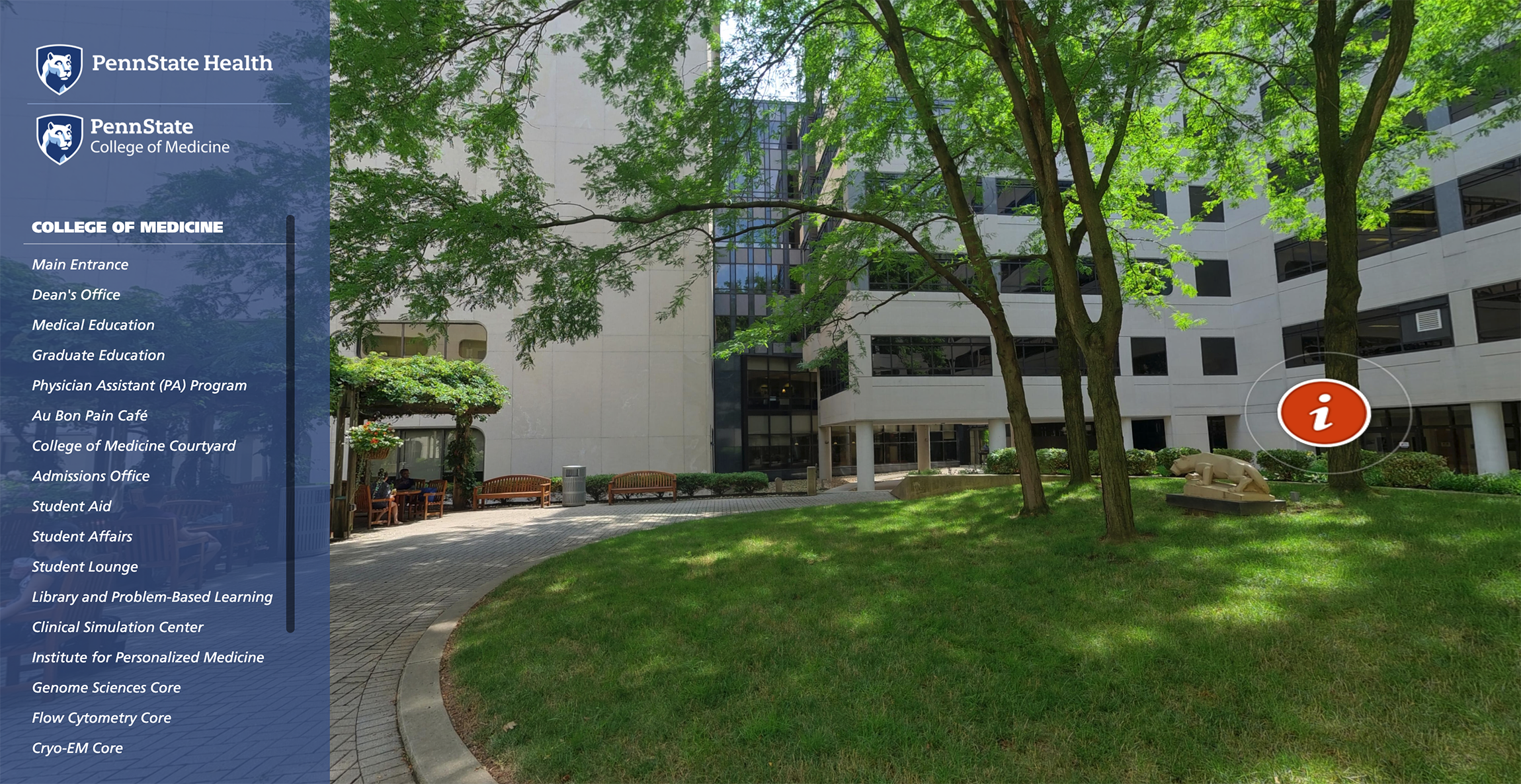
The background image is Two people stand face-to-face while talking to each other at the top of a staircase in the courtyard of Penn State College of Medicine, with the Nittany Lion statue in the background to the left
Addressing Community Health Needs, Eliminating Disparities
Join the next generation of primary care researchers making an impact on rural and underserved communities with focused training on health disparities, overdose, substance use, and mental health.
Fellowship Information
Program Overview
Program Overview
- Eligibility – MD, DO, PhD or other terminal doctoral degree in biomedicine.
- The PCRF is a two-year training program with multidisciplinary mentors across Penn State, including different colleges, institutes and campuses. Fellows’ training and research can span traditional primary care-relevant, or focus on health disparities, overdose, substance use and mental health.
- An individually-tailored training program is the fellowship’s core. Fellows have access to a vast array of coursework, certificate, and degree programs; mentored research experiences across numerous departments, schools and institutes; and a collegial research-oriented institutional and departmental culture.
- Consistent with the diversity of primary care and the range of experience of the fellows, we have a core set of required, shared experiences and tailor the majority of learning experiences to each fellow’s needs.
- Diverse fellows learn to conduct culturally competent, high-quality primary care research and advance their careers toward the goal of becoming independent investigators able to conduct innovative primary care-based research that improves health outcomes in areas of high public health need.
- Federal funds provide for stipends, tuition and other research related travel and supplies.
Training Elements
Essential Elements of the Training
The fellowship’s curriculum is based on the three pillars of the learning environment:
- Individualized coursework, certificates and degrees, including:
- Certificates/masters programs in clinical, translational, qualitative, several statistical/AI, machine learning programs
- Mentored interdisciplinary translational research
- Tailored seminar series, including:
- Grant writing, including K and R level grants
- Research design methodologies
- Manuscript development
- Team and Translational science
- Preparing conference presentations
- Dissemination of research
Planning for individualized training begins during the interview/hiring process, with discussion of optimal coursework, research questions and content mentors. The overall development plan and mentorship groups, including peer and near-peers, are established early in Year 1.
Fellows begin research activities immediately, devoting time to deliverables, which can include review and other articles, conference abstracts and grant proposals. Ongoing bi-directional review with mentors facilitates each fellow’s forward progress and productive mentor-mentee collaboration.
- Individualized coursework, certificates and degrees, including:
Institutional Resources
Institutional Research Resources
- Study design, marketing, communications: Clinical and Translational Science Institute (CTSI)
- College of Medicine Research
- Research Development: researcher development, proposal development, funding sources
- Literature Review: Harrell Health Sciences Library, Esther Dell, DFCM Departmental Liaison
- Brainstorming/Collaboration: Research Concierge
- Qualitative Mixed Methods Core (QMMC) – an institutional core that supports the performance of rigorous qualitative and mixed methods research at Penn State College of Medicine and Penn State Health in three main service areas:
- Study Design/Consultation
- Education
- Implementation Services
- Federal Work Study, MSR projects
- Institutional Review Board/ Human Subjects Protection Office
Why Penn State
Why Penn State
The Penn State Primary Care Research Fellowship (PCRF) provides an exceptional research training opportunity for postgraduate learners who wish to receive training in primary care research and address some of the most pressing problems in public health and health care, including substance use, mental health disorders and socioeconomic disparities.
The catchment area for Penn State College of Medicine and Penn State Health includes rural, suburban and urban communities and is diverse in age, race and ethnicity, disability, economic and educational status and health disparities, compared to state and national averages. Urban centers (Reading, Harrisburg, Lancaster and Lebanon) are more diverse, with less favorable health profiles than the counties in which they are located. This area includes part of Appalachia, a region with well-documented poverty and health disparities that spans 420 mostly-rural counties in 13 states, including 52 of Pennsylvania’s 67 counties.
Among the most alarming recent national trends is the increase in mortality due to opioid overdose, substance use and use disorders (SUD) and mental health disorders (MHD). Termed “diseases or deaths of despair,” they have disproportionately affected Appalachia and Pennsylvania.
The fellowship emphasizes strategic priorities of health equity, disease prevention and health promotion and community health in developing primary care researchers who will address priorities of ending the crises of overdose, SUD and MHD.The fellowship is led by experienced clinician-scientists in Family and Community Medicine, General Internal Medicine and General Pediatrics, in collaboration with partners from the broader Penn State community, with faculty from diverse backgrounds and disciplines who bring varied perspectives to the investigation of complex problems. The rigorous program is guided by leading-edge concepts of active mentorship, experiential learning, diversity, equity and inclusion, translational research and team science.
Eligibility and Application
Eligibility and Application
Eligible candidates will have an MD/DO/PhD or equivalent terminal degrees from a wide range of disciplines, including medicine, pharmacy, nursing, psychology or the social sciences. Eligibility includes being a U.S. citizen or permanent resident.
Direct any inquiries related to the application process to:
Holly-Mae Carver
Education Program Coordinator
Penn State College of Medicine
Department of Family & Community MedicineEmail: PCRF@pennstatehealth.psu.edu
Program Overview
- Eligibility – MD, DO, PhD or other terminal doctoral degree in biomedicine.
- The PCRF is a two-year training program with multidisciplinary mentors across Penn State, including different colleges, institutes and campuses. Fellows’ training and research can span traditional primary care-relevant, or focus on health disparities, overdose, substance use and mental health.
- An individually-tailored training program is the fellowship’s core. Fellows have access to a vast array of coursework, certificate, and degree programs; mentored research experiences across numerous departments, schools and institutes; and a collegial research-oriented institutional and departmental culture.
- Consistent with the diversity of primary care and the range of experience of the fellows, we have a core set of required, shared experiences and tailor the majority of learning experiences to each fellow’s needs.
- Diverse fellows learn to conduct culturally competent, high-quality primary care research and advance their careers toward the goal of becoming independent investigators able to conduct innovative primary care-based research that improves health outcomes in areas of high public health need.
- Federal funds provide for stipends, tuition and other research related travel and supplies.
Essential Elements of the Training
The fellowship’s curriculum is based on the three pillars of the learning environment:
- Individualized coursework, certificates and degrees, including:
- Certificates/masters programs in clinical, translational, qualitative, several statistical/AI, machine learning programs
- Mentored interdisciplinary translational research
- Tailored seminar series, including:
- Grant writing, including K and R level grants
- Research design methodologies
- Manuscript development
- Team and Translational science
- Preparing conference presentations
- Dissemination of research
Planning for individualized training begins during the interview/hiring process, with discussion of optimal coursework, research questions and content mentors. The overall development plan and mentorship groups, including peer and near-peers, are established early in Year 1.
Fellows begin research activities immediately, devoting time to deliverables, which can include review and other articles, conference abstracts and grant proposals. Ongoing bi-directional review with mentors facilitates each fellow’s forward progress and productive mentor-mentee collaboration.
Institutional Research Resources
- Study design, marketing, communications: Clinical and Translational Science Institute (CTSI)
- College of Medicine Research
- Research Development: researcher development, proposal development, funding sources
- Literature Review: Harrell Health Sciences Library, Esther Dell, DFCM Departmental Liaison
- Brainstorming/Collaboration: Research Concierge
- Qualitative Mixed Methods Core (QMMC) – an institutional core that supports the performance of rigorous qualitative and mixed methods research at Penn State College of Medicine and Penn State Health in three main service areas:
- Study Design/Consultation
- Education
- Implementation Services
- Federal Work Study, MSR projects
- Institutional Review Board/ Human Subjects Protection Office
Why Penn State
The Penn State Primary Care Research Fellowship (PCRF) provides an exceptional research training opportunity for postgraduate learners who wish to receive training in primary care research and address some of the most pressing problems in public health and health care, including substance use, mental health disorders and socioeconomic disparities.
The catchment area for Penn State College of Medicine and Penn State Health includes rural, suburban and urban communities and is diverse in age, race and ethnicity, disability, economic and educational status and health disparities, compared to state and national averages. Urban centers (Reading, Harrisburg, Lancaster and Lebanon) are more diverse, with less favorable health profiles than the counties in which they are located. This area includes part of Appalachia, a region with well-documented poverty and health disparities that spans 420 mostly-rural counties in 13 states, including 52 of Pennsylvania’s 67 counties.
Among the most alarming recent national trends is the increase in mortality due to opioid overdose, substance use and use disorders (SUD) and mental health disorders (MHD). Termed “diseases or deaths of despair,” they have disproportionately affected Appalachia and Pennsylvania.
The fellowship emphasizes strategic priorities of health equity, disease prevention and health promotion and community health in developing primary care researchers who will address priorities of ending the crises of overdose, SUD and MHD.
The fellowship is led by experienced clinician-scientists in Family and Community Medicine, General Internal Medicine and General Pediatrics, in collaboration with partners from the broader Penn State community, with faculty from diverse backgrounds and disciplines who bring varied perspectives to the investigation of complex problems. The rigorous program is guided by leading-edge concepts of active mentorship, experiential learning, diversity, equity and inclusion, translational research and team science.
Eligibility and Application
Eligible candidates will have an MD/DO/PhD or equivalent terminal degrees from a wide range of disciplines, including medicine, pharmacy, nursing, psychology or the social sciences. Eligibility includes being a U.S. citizen or permanent resident.
Direct any inquiries related to the application process to:
Holly-Mae Carver
Education Program Coordinator
Penn State College of Medicine
Department of Family & Community Medicine
Email: PCRF@pennstatehealth.psu.edu
Director

David P. Rábago, MD
Fellowship Director and Family Medicine Vice Chair of Faculty Development
David Rábago, MD, is an active clinician/scientist/educator with a previous NIH K-23 award for mentored career development (2005-2009). His research interests include assessment of non-opioid therapy for chronic pain and integrative therapies for upper respiratory disease. Dr. Rábago had led two HRSA primary care research fellowships in the role of program director.
Leadership
Faculty
Current Fellows

David P. Rábago, MD
Fellowship Director and Family Medicine Vice Chair of Faculty Development
David Rábago, MD, is an active clinician/scientist/educator with a previous NIH K-23 award for mentored career development (2005-2009). His research interests include assessment of non-opioid therapy for chronic pain and integrative therapies for upper respiratory disease. Dr. Rábago had led two HRSA primary care research fellowships in the role of program director.
Latest News in College of Medicine Research
The background image is Four trainees sit around a table with computers, all looking in the direction of a presenter not shown.
Contact Us
Holly-Mae Carver
Education Program Coordinator
Penn State College of Medicine
Department of Family & Community Medicine
Email: PCRF@pennstatehealth.psu.edu
Diversity
Institutional Resources
Penn State Health and Penn State College of Medicine celebrate, embrace and support the diversity of all patients, faculty, staff, students and trainees.
Office for Diversity, Equity and Inclusion
In keeping with this, Penn State Health has an active Office for Diversity, Equity and Inclusion with various programs, networks and resource groups.
Penn State Health Office for Diversity, Equity and Inclusion
College of Medicine Office for Diversity, Equity and Belonging
Office for a Respectful Learning Environment
In addition, the institution does not tolerate discrimination, biases, microaggression, harassment or learner mistreatment of any kind, and any concerns are immediately addressed by the Office for a Respectful Learning Environment.
Wellness Initiatives
Wellness, including emotional, spiritual, social and physical health, is a crucial component to training and to becoming a professional, compassionate and resilient physician. Self-care is a skill which must be continually practiced and reinforced. Penn State College of Medicine and Penn State Health are committed to addressing wellness among residents and fellows, with multiple resources readily available.
Institutional resources
College of Medicine Virtual Tour
Virtual Tour
About Hershey
Welcome to Hershey
More About Hershey
Interested in learning more about living and working in Hershey, Pa.?
See details here:


